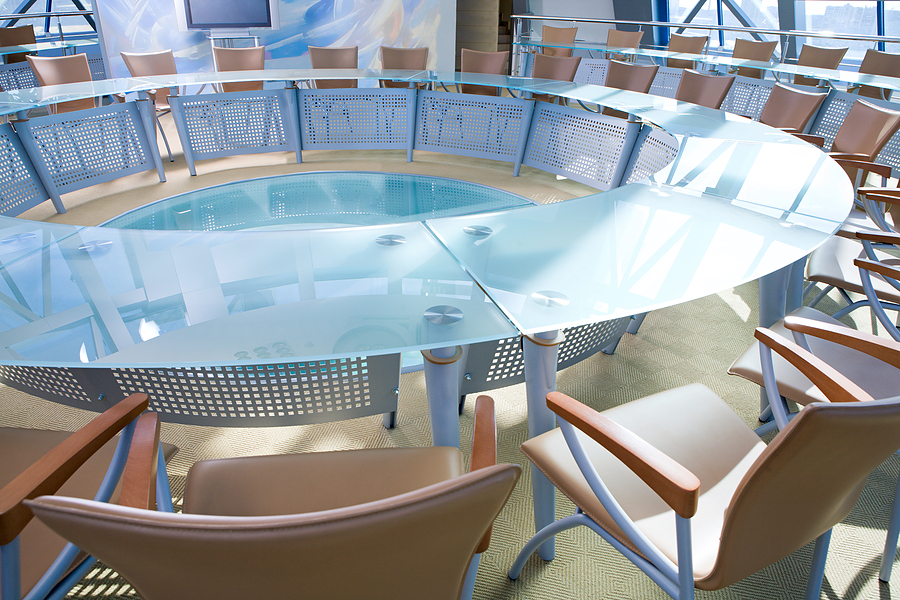Most of the time, this blog is devoted to the pleasures and occasional difficulties of living in France as an expat – the travel opportunities, the incredible experience of food and wine, and the culture and history of the country. In a couple of forums, though, I’ve written about what it was like to work in a French company in the deep heart of France – how to adapt to a Cartesian decision-making process, for example, and the reality behind the elusive “35-hour work week.”
This week: a quick tour of some of the things that happen at the office that might at first seem trivial, but which (I think) have a real significance in the way people work in France.
1. The daily greeting
For Anglo-Saxons, this can be one of the most daunting aspects of office life, particularly for the new arrival in the workplace. There’s a whole elaborate etiquette associated with coming into the office every morning and greeting your colleagues. It can be quick, even perfunctory – no one seems to expect a long conversation – but you’re supposed to make the rounds of the area in which you work, shake hands and say “bonjour” to everyone you encounter.
(One variant on this ritual: If you walk into a meeting room or a large open office area, it seems to be OK to cheerfully announce “bonjour” to the whole room as you come in, although you’d still shake hands with individuals in your immediate vicinity as you settle in.)

If your co-worker is off the opposite sex, and you know him or her well enough, you may be expected to “faire la bise” – a quick exchange of air kisses, one on each side of the face. Here’s the catch: No one I’ve ever met can tell you what “well enough” means, and this can lead to some awkward moments when the person you’re greeting offers up a cheek instead of a handshake. For an American, thoroughly trained in avoiding even the faintest hint of sexual harassment, it seems like a minefield, but one which the French seem to navigate with no difficulty at all.

The other part of the ritual I never mastered is that you’re only supposed to say “bonjour” and exchange handshakes ONCE each day — if you forget and try to re-greet someone later in the day, they may duck the handshake, put up their hands and say “on s’est vu” (“we’ve already seen each other today”). My memory was never good enough by 3:00 in the afternoon to remember who I’d already seen and who I hadn’t!

2. The coffee break
Inevitably, around 9:30 or 10:00 in the morning, and again later in the afternoon, someone will pop into your doorway and ask “un petit café?” Little knots of people form up around the coffee machine at the end of the hall, and for 15 or 20 minutes everyone takes a little pause from work. It’s such an important part of the culture that there was even a whole TV series of short skits on French TV seen from a camera inside the coffee machine, capturing all the little office dramas that played out in the break room.
For someone unaccustomed to this rhythm, the coffee break appears to be a huge hit to the productivity of the office. Except, of course, that the conversation is often a continuation, or even an intensification of whatever discussions you’ve been having in your work, and some of the most productive conversations I ever had happened one-on-one at the coffee machine rather than in an open meeting.
Even when the talk is not about work, it’s one of the rare opportunities you’ll have to get a glimpse into the personal lives of your colleagues. Remember, too, that people are often working 10 to 12 hours a day, and that researchers agree that an occasional break is actually good for concentration and productivity, and the logic behind this particular ritual becomes clearer.
3. The email sign-off
Email is already a curt, direct medium for writing. My habit before I moved to France the first time was to say what I was asking for, then sign off with a quick “thanks!” or “let me know what you think”. When I started writing mails in French, I replicated the habit by ending simply with “merci de votre aide”.
Remember, though, that French was for a very long time the language of global diplomacy, and there’s still an expectation of some degree of politesse in even routine business communications. This is still a country, after all, where a letter from the gas company demanding a payment ends with “je vous prie d’agréer, Monsieur, mes salutations distinguées” (“Please accept, Sir, my distinguished salutations”).

Early on in my first expat assignment, one of my team members took me aside and said (only half joking), “you know, I’m not your servant.”
“Of course I know that – what made you think I felt you were?”
“The email you sent asking me to go to a meeting – you just ended it with ‘thanks’. That makes me feel that our relationship is purely transactional, that you’ve taken out the personal element.”
“What should I say instead?”
“It’s OK to say thank you for doing what you ask, but after that you should sign off more personally – something like ‘cordialement’ or ‘sincères salutations’ – but something, anyway, that sounds more polite.”
This might seem to be a minor detail, but I was called out on it more than once before I changed my approach.
4. The culture of “pas mal”
I have had the privilege of working with some of the world’s finest engineers in France, trained in the country’s grandes écoles and capable of competing in any marketplace on the planet. They generate more patents than almost any other company in the country and have arguably produced some of the most innovative products ever seen in their field.

And yet…they are possessed of that characteristic French talent for self-deprecation, even negativity, when it comes to their work. Try giving someone a genuine compliment, and he will deflect it completely. Tell someone during a performance review that she’s doing great work and she will look at you skeptically, waiting for the other shoe to drop. Mention during a meeting that Jean-Paul has a brilliant idea to propose and he will squirm in his chair and spill out all the negatives about the idea before he gets to the real substance.

I offer this observation without comment, given that so much has been written by the French themselves about their national obsession with being negative. And I genuinely dislike the American excess of compliments and the approach of giving gold stars to anyone who makes an effort. But I do wish the French could find a middle ground on this point. Even now, it pains me when a seriously good idea gets presented in a meeting and the boss responds – even knowing that it truly is a great idea – “oui, c’est pas mal, mais…” (“OK, that’s not bad, but…”)
Would I do it all over again? In a heartbeat!
Lest you think that I didn’t like working in a French office, I have to repeat what I said in my first post on working with the French: “the important thing is to remember that ‘different’ does not mean ‘bad.’ And adjusting to these differences is nothing compared to the incredibly rich and satisfying experience of learning to work effectively with people who have a different way of looking at the world. The fact that it’s happening in France, where you can walk to work past a medieval cathedral, have a proper four-course lunch in the company cafeteria, and go home to a fine bottle of wine – well, that was the biggest ‘bonus’ of my professional life!”
What about you – what’s been your experience working in France? Have you every bumped up against one of these situations – or something else that particularly caught you by surprise? Please share your experience in the comments section -- and please share this post with others by clicking on one of the social-media buttons below!



Genuinely laugh out loud stuff. I love the complexities of French society.
We’ve asked the question when does Bon Après Midi become Bon soir and then when does that become Bon Nuit? Still waiting for the definitive answer!
Yes, Jane, I agree — I always felt that no matter what I said, someone would say the other (no matter what the time of day!). If I say “bon apres midi” I’m pretty certain the person would respond, “oui, bon soir!” Thanks very much for your comment!
Excellent post, Richard!! I still can’t quite get la bise right, the email formality still comes across as over the top to me, and I can’t stand when my husband says things are “pas mal.” Now after being married for 6 years, he understands why it’s important to me to be a little more positive with seemingly insignificant word choices. He can say pas mal all he wants in French, but if we’re speaking English (which is most of the time), he’d better say something was well done or even great!
Loved this and sharing on FB later!
Thank you, Diane – it’s good to hear from you! (Thanks, too, for the share.)
Love this post so much! Many years ago I exchanged my teaching post, in London, for one in a collège, in France. My first mistake was to turn up an hour before school started! We always used to do this in London, to prep etc etc. Not so in France; I was amazed when the teachers arrived one minute before the bell. There are so many other examples in the education system. Had a wonderful year although, unfortunately, the same couldn’t be said for my exchange colleague!
Thanks for sharing your experience, June! (I also started out showing up at the office at 7:00 or 7:30 in the morning, just as I always had in the U.S. … until I found I was by myself for an hour or more!) Thanks very much for reading.
This is a very interesting post. I have never worked in an office in France – I have been freelancing here for nearly forty years – but when my French-born-and-bred-but-in-a-mixed-French-Australian-household went to work in Australia, he was not at all happy. He told me that one day a colleague said “hey, let’s grab a coffee” and he thought, “at last, I’m going to be part of the team”. They went to the coffee machine, each got a coffee, then went back to their desks!
The email sign-off is also interesting. When I started freelancing, email didn’t exist of course, but over the years I’ve been very careful to take note of how people start and end emails.
You start an email exchange with “Bonjour” and the person also says “Bonjour”. If the same discussion is continued, the next time, you don’t say “bonjour”, but use the person’s name.
And, as you were told “Merci de votre aide” is not appropriate. I don’t think I have ever seen it!
Great post in any case!
Thanks very much, Rosemary – the complexities of French etiquette certainly require some study and “flexibility” in order to get them right! Thank you for reading.
The only time I worked in an office environment in France there were only 3 of us, all female and about the same age so complications with la bise and coffee machines didn’t arise. But I can just imagine how difficult some situations must be having lived here for 20 years. Great post as usual Richard. Thanks for linking to #AllAboutFrance
Thanks very much, Phoebe! I’ve particularly enjoyed this month’s link-up at #AllAboutFrance!
I am French (and long time expat) and I remember being called out by the boss on one of my first jobs because I didn’t go around the entire office every morning to shake hands with everyone! What a minefield this is! Great post though, very funny to get a foreigner’s take on French work life.
#AllAboutFrance
Bonjour Annette. Thanks very much for passing on your experience! Glad you enjoyed the post. #AllAboutFrance